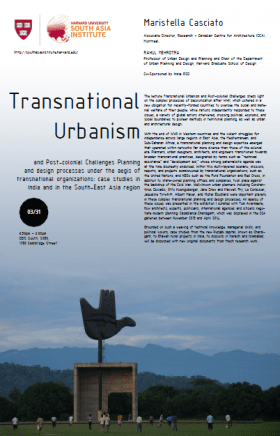Urbanization Seminar
Speaker: Maristella Casciato, Associate Director, Research – Canadian Centre for Architecture (CCA), Montreal.
Chair: Rahul Mehrotra, Professor of Urban Design and Planning and Chair of the Department of Urban Planning and Design, Harvard Graduate School of Design.
The lecture Transnational Urbanism and Post-colonial Challenges sheds light on the complex processes of decolonization after WWII, which ushered in a new obligation for recently-formed countries to oversee the social and material welfare of their people. While nations independently responded to these issues, a variety of global actors intervened, crossing political, economic, and social boundaries to pioneer methods in territorial planning, as well as urban and architectural design.
With the end of WWII in Western countries and the violent struggles for independence across large regions in East Asia, the Mediterranean, and Sub-Saharan Africa, a transnational planning and design expertise emerged that operated within networks far more diverse than those of the colonial era. Planners, urban designers, architects, and engineers transitioned towards broader transnational practices, designated by terms such as “technical assistance” and “development aid,” whose strong paternalistic agenda was at the time discreetly endorsed. Within this multi-layered scenario, missions, reports, and projects commissioned by transnational organizations, such as the United Nations, and NGOs such as the Ford Foundation and Red Cross, in addition to state-owned planning offices and companies, took place against the backdrop of the Cold War. Well-known urban planners including Constantinos Doxiadis, Otto Koenigsberger, Jane Drew and Maxwell Fry, Le Corbusier, Jaqueline Tyrwhitt, Albert Mayer, and Michel Écochard were important players in these complex transnational planning and design processes. An aperçu of these issues was presented in the exhibition I curated with Tom Avermaete, How architects, experts, politicians, international agencies and citizens negotiate modern planning: Casablanca Chandigarh, which was displayed in the CCA galleries between November 2013 and April 2014.
Grounded on such a weaving of technical knowledge, managerial skills, and political visions, case studies from the new Punjabi capital, known as Chandigarh, to Etawah rural projects in India, to missions in Karachi and Islamabad, will be discussed with new original documents from fresh research work.
Co-sponsored with the India GSD.

